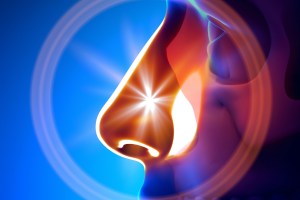Nasal polyps are soft, painless growths inside the nasal passages or sinuses. They are non-cancerous and often develop as a result of chronic inflammation. However, they don’t always cause symptoms when small, larger polyps can lead to significant discomfort and health issues. Understanding the symptoms, causes, and treatments of nasal polyps is essential for managing this condition effectively. Read this to learn the symptoms to watch for and to know when to see an ENT doctor in Costa Mesa.
What Are Nasal Polyps?
Nasal polyps are small, teardrop-shaped growths that can appear in one or both nasal passages. They are made up of inflamed tissue and can vary in size. Nasal polyps often develop in clusters and can block the nasal passages, leading to breathing difficulties and other complications.
Symptoms of Nasal Polyps
Nasal polyps can cause a variety of symptoms, especially if they grow large or in clusters. Here are some common symptoms:
Nasal Congestion: One of the most common symptoms is a persistent stuffy nose.
Runny Nose: Many people with nasal polyps experience a chronic runny nose. The mucus might be clear or colored.
Postnasal Drip: This is when mucus runs down the back of your throat, causing irritation and a constant need to clear your throat.
Reduced Sense of Smell and Taste: Nasal polyps can block your sense of smell and, in turn, affect your ability to taste.
Facial Pain or Pressure: You might feel pressure or pain in your face, especially around your eyes and forehead.
Snoring: Nasal polyps can cause snoring because they obstruct the airflow through the nasal passages.
Sleep Apnea: In severe cases, nasal polyps can lead to obstructive sleep apnea, a condition where you stop breathing during sleep.
Headaches: The blockage caused by nasal polyps can lead to headaches, especially if sinus infections occur frequently.
Nasal polyp symptoms can be painful and uncomfortable. As the symptoms progress, breathing difficulties are more likely to persist. An ENT doctor in Costa Mesa can provide timely treatment to restore nasal health and breathing comfort.
Causes of Nasal Polyps
Nasal polyps are associated with inflammation in the nasal passages and sinuses. Several factors can contribute to the development of nasal polyps:
- Chronic Sinusitis: Long-term inflammation of the sinuses is one of the most common conditions associated with nasal polyps. This inflammation can be caused by infections, allergies, or irritants.
- Asthma: Individuals with asthma are more likely to develop nasal polyps. The link between asthma and nasal polyps is thought to be related to the underlying inflammation present in both conditions.
- Allergic Rhinitis: Also known as hay fever, allergic rhinitis is an allergic reaction to airborne substances like pollen, dust, or pet dander. It can cause chronic inflammation in the nasal passages, leading to polyps.
- Cystic Fibrosis: This genetic disorder causes thick, sticky mucus to build up in the body and in the nasal passages. People with cystic fibrosis are at a higher risk of developing nasal polyps.
- Aspirin Sensitivity: Some people who are sensitive to aspirin and other nonsteroidal anti-inflammatory drugs (NSAIDs) are more prone to nasal polyps.
- Immune System Response: An abnormal immune system response can lead to chronic inflammation, which in turn can cause nasal polyps to develop.
Diagnosing Nasal Polyps
If you experience symptoms of nasal polyps, it’s important to see an ENT doctor in Costa Mesa for a proper diagnosis. The following methods are commonly used to diagnose nasal polyps:
- Physical Examination: A doctor will look inside your nose using a nasal endoscope, a thin, flexible tube with a camera and light at the end. This helps them see the polyps directly.
- Imaging Tests: CT scans or MRI scans can provide detailed images of your sinuses and nasal passages, showing the size and location of the polyps.
- Allergy Tests: If allergies are suspected as a cause, your doctor might recommend allergy tests to identify specific triggers.
- Nasal and Sinus Cultures: In some cases, a mucus sample might be necessary to test for bacterial or fungal infections.
Treatments for Nasal Polyps
Treatment for nasal polyps aims to reduce the size of the polyps or eliminate them and manage any underlying conditions. Here are the common treatments provided by ENT doctors in Costa Mesa:
1. Medications
Nasal Corticosteroids: These are sprays that reduce inflammation in the nasal passages. They can help shrink the polyps or eliminate them entirely. Examples include fluticasone, budesonide, and mometasone.
Oral Corticosteroids: For larger polyps, oral corticosteroids like prednisone may be prescribed. They are usually taken for a short period due to potential side effects.
Antihistamines: If allergies are contributing to the inflammation, antihistamines can help manage allergic reactions.
Antibiotics: If there is a bacterial infection in the sinuses, antibiotics might be prescribed.
Biologics: These are newer medications that target specific pathways in the immune system.
2. Surgery
If medications do not effectively manage nasal polyps, surgery may be necessary. Surgical options include:
Polypectomy: This is a minimally invasive procedure where an ENT doctor in Costa Mesa removes the polyps using a small suction device or microdebrider.
Endoscopic Sinus Surgery: This procedure involves using an endoscope to guide the removal of polyps and other obstructions from the sinuses.
Managing Nasal Polyps Long-Term

- Follow Treatment Plans: Continue using prescribed medications as directed by your doctor to keep inflammation under control.
- Avoid Triggers: Identify and avoid allergens or irritants that cause inflammation in your nasal passages.
- Use a Humidifier: Keeping the air in your home moist can help reduce irritation and keep your nasal passages clear.
- Practice Good Hygiene: Regularly washing your hands and avoiding close contact with people who have respiratory infections can prevent sinus infections.
- Rinse Your Nasal Passages: Using a saline rinse can help keep your nasal passages clear and reduce the risk of inflammation and infection.
When to See an ENT Doctor in Costa Mesa
It’s important to seek medical attention if you experience symptoms of nasal polyps, especially if:
Symptoms Persist: If your symptoms do not improve with over-the-counter treatments or home remedies, see a doctor.
Breathing Problems: Difficulty breathing through your nose or if you develop obstructive sleep apnea.
Severe Symptoms: Intense facial pain, severe headaches, or vision changes should be evaluated by a healthcare professional.
Conclusion
Nasal polyps can significantly impact your quality of life, causing discomfort and various symptoms like nasal congestion, runny nose, and headaches. Understanding the symptoms, causes, and treatments of nasal polyps is crucial for managing the condition effectively. You can find relief and improve your overall well-being with proper diagnosis and treatment from an ENT doctor in Costa Mesa.
If you suspect you have nasal polyps, contact Orange Coast ENT Head and Neck Surgery to schedule an appointment for treatment.

